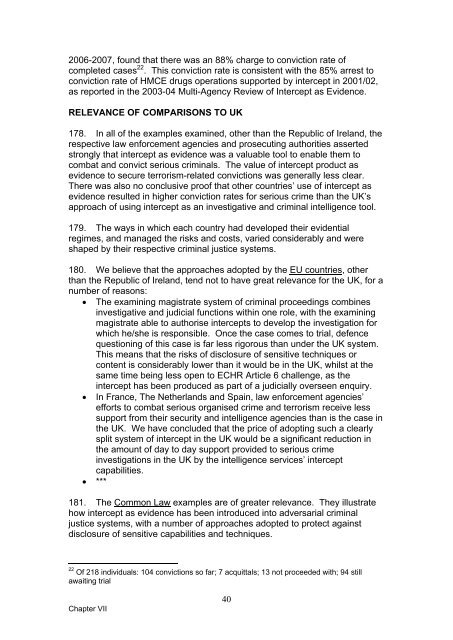Privy Council Review of intercept as evidence: report - Official ...
Privy Council Review of intercept as evidence: report - Official ...
Privy Council Review of intercept as evidence: report - Official ...
You also want an ePaper? Increase the reach of your titles
YUMPU automatically turns print PDFs into web optimized ePapers that Google loves.
2006-2007, found that there w<strong>as</strong> an 88% charge to conviction rate <strong>of</strong><br />
completed c<strong>as</strong>es 22 . This conviction rate is consistent with the 85% arrest to<br />
conviction rate <strong>of</strong> HMCE drugs operations supported by <strong>intercept</strong> in 2001/02,<br />
<strong>as</strong> <strong>report</strong>ed in the 2003-04 Multi-Agency <strong>Review</strong> <strong>of</strong> Intercept <strong>as</strong> Evidence.<br />
RELEVANCE OF COMPARISONS TO UK<br />
178. In all <strong>of</strong> the examples examined, other than the Republic <strong>of</strong> Ireland, the<br />
respective law enforcement agencies and prosecuting authorities <strong>as</strong>serted<br />
strongly that <strong>intercept</strong> <strong>as</strong> <strong>evidence</strong> w<strong>as</strong> a valuable tool to enable them to<br />
combat and convict serious criminals. The value <strong>of</strong> <strong>intercept</strong> product <strong>as</strong><br />
<strong>evidence</strong> to secure terrorism-related convictions w<strong>as</strong> generally less clear.<br />
There w<strong>as</strong> also no conclusive pro<strong>of</strong> that other countries’ use <strong>of</strong> <strong>intercept</strong> <strong>as</strong><br />
<strong>evidence</strong> resulted in higher conviction rates for serious crime than the UK’s<br />
approach <strong>of</strong> using <strong>intercept</strong> <strong>as</strong> an investigative and criminal intelligence tool.<br />
179. The ways in which each country had developed their evidential<br />
regimes, and managed the risks and costs, varied considerably and were<br />
shaped by their respective criminal justice systems.<br />
180. We believe that the approaches adopted by the EU countries, other<br />
than the Republic <strong>of</strong> Ireland, tend not to have great relevance for the UK, for a<br />
number <strong>of</strong> re<strong>as</strong>ons:<br />
The examining magistrate system <strong>of</strong> criminal proceedings combines<br />
investigative and judicial functions within one role, with the examining<br />
magistrate able to authorise <strong>intercept</strong>s to develop the investigation for<br />
which he/she is responsible. Once the c<strong>as</strong>e comes to trial, defence<br />
questioning <strong>of</strong> this c<strong>as</strong>e is far less rigorous than under the UK system.<br />
This means that the risks <strong>of</strong> disclosure <strong>of</strong> sensitive techniques or<br />
content is considerably lower than it would be in the UK, whilst at the<br />
same time being less open to ECHR Article 6 challenge, <strong>as</strong> the<br />
<strong>intercept</strong> h<strong>as</strong> been produced <strong>as</strong> part <strong>of</strong> a judicially overseen enquiry.<br />
In France, The Netherlands and Spain, law enforcement agencies’<br />
efforts to combat serious organised crime and terrorism receive less<br />
support from their security and intelligence agencies than is the c<strong>as</strong>e in<br />
the UK. We have concluded that the price <strong>of</strong> adopting such a clearly<br />
split system <strong>of</strong> <strong>intercept</strong> in the UK would be a significant reduction in<br />
the amount <strong>of</strong> day to day support provided to serious crime<br />
investigations in the UK by the intelligence services’ <strong>intercept</strong><br />
capabilities.<br />
***<br />
181. The Common Law examples are <strong>of</strong> greater relevance. They illustrate<br />
how <strong>intercept</strong> <strong>as</strong> <strong>evidence</strong> h<strong>as</strong> been introduced into adversarial criminal<br />
justice systems, with a number <strong>of</strong> approaches adopted to protect against<br />
disclosure <strong>of</strong> sensitive capabilities and techniques.<br />
22 Of 218 individuals: 104 convictions so far; 7 acquittals; 13 not proceeded with; 94 still<br />
awaiting trial<br />
Chapter VII<br />
40
















